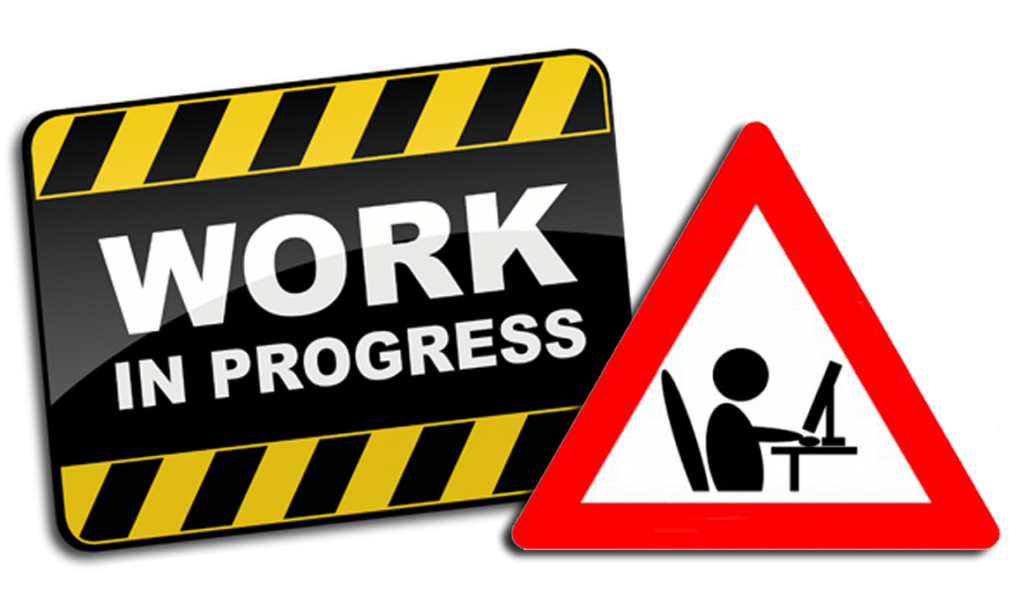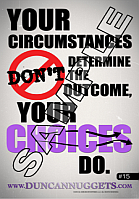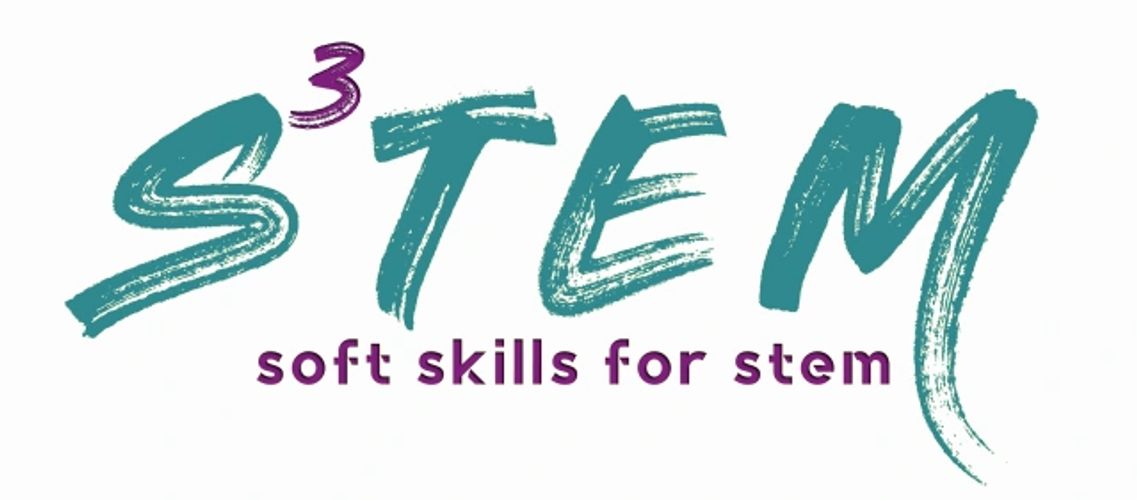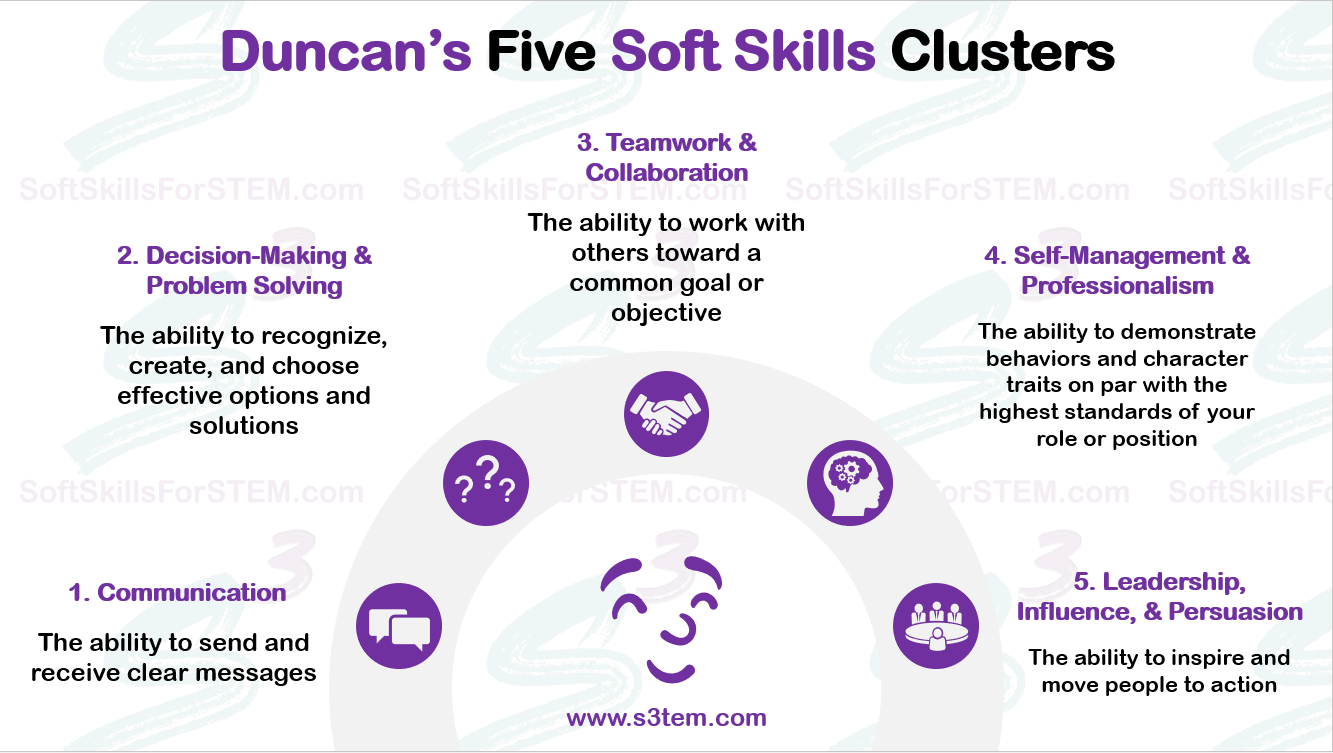Self-Management & Professionalism – soft skills cluster

List of Soft Skills Clusters (Beta – That means I’m still working on this. Thanks for you patience.)
Main Page of Soft Skills Clusters
(Sources are listed at the bottom of the main page.)
Decision Making & Problem Solving Skills
Teamwork & Collaboration Skills
Self-Management & Professionalism Skills
Leadership, Influence & Persuasion Skills
key behavioral indicators
This is how you prove you have strong self-management & professionalism skills.
- Be on time.
- Plan, prioritize, and organize your work.
- Get your work done.
- Show initiative.
- Maintain a positive attitude when experiencing challenges.
- Know and maximize your strengths.
- Know and manage your weaknesses.
- Perform at a high level when under pressure.
- Show perseverance and diligence in dealing with difficulties.
- Set and achieve high standards.
- Establish and communicate a sense of direction.
- Make and take responsibility for decisions.
- Seek feedback on performance and take positive steps to improve.
- Take responsibility for your own learning & development needs.
- Embrace the culture of the organization.
- Dress according to organizational guidelines.
- Adapt your approach or style to a range of individuals and circumstances.
individual skills
These are the skills you develop to produce the desired behavioral indicators.
Adaptability: Able to change or be changed in order to fit or work better in some situation or for some purpose.
Related terms: adaptive leadership, flexibility, innovative, leadership agility
Tip: Adaptability is one of the best tools a leader can have. According to the Harvard School of Business, “adaptability is the new competitive advantage for companies” This applies to individuals as well. You can’t have an adaptive company without adaptive employees.
Example of an Adaptability Assessment – Emotional Competence Inventory (ECI) tests adaptability on four scales:
— Openness to new ideas.
— Adaptation to situations.
— Handling of unexpected demands.
— Adapting or changing strategy.
Attitude: A settled way of thinking or feeling about someone or something, typically one that is reflected in a person’s behavior.
Tip: Your attitude about your work and life plays a big role in how people perceive what you do. In many cases, your attitude determines how people feel about your actions and skills. Most people feel like a person’s attitude provide insight into a person’s character and future behaviors.
Watch: Duncan Nugget® #10: According To Your Attitude
Positive mental attitude (PMA) is the philosophy that having an optimistic disposition, regardless of the circumstances, attracts positive changes and increases achievement.
There is still a great deal of debate about whether or not the effects of PMA or positive thinking are real. There is research to support both sides of the debate.
Character: The mental and moral qualities distinctive to an individual.
Related term: personality
Tip: Research by James Heckman states that “Character is a skill, not a trait. At any age, character skills are stable across different tasks, but skills can change over the life cycle. Character is shaped by families, schools, and social environments. Skill development is a dynamic process, in which the early years lay the foundation for successful investment in later years.”
The mental aspects of character, often referred to as performance values, include abilities such as grit, curiosity, and self-control. The moral aspects of character include attributes such as honesty, fairness, and responsibility.
Character Strengths: Positive psychological traits of human beings.
Related terms: character traits, performance values
Tip: Character Strengths and Virtues is probably the most comprehensive and authoritative book on character strengths. It identifies six classes of virtue made up of twenty-four measurable character strengths.
The FAQ for the VIA® Institute On Character explains that character strengths:
— Have individual differences. Each is distinct from one another.
— Are plural, meaning they interact and influence each other.
— Are generally stable, but they can change over time.
— Are shaped by context.
Character strengths do not operate in isolation from settings, proximal and distal, in which people are found. Character strengths are within people and people are within settings. Settings cannot fall to the background when focusing on character strengths.
Duncan Nugget® #47:
Focus on your strengths, manage your weaknesses.
Strengths based coaching, training, and development has proven to be effective in helping people attain greater levels of success and happiness.
Compassion: Sympathetic pity and concern for the sufferings or misfortunes of others.
Related term: empathy
Tip: We’ve all heard stories about mean-spirited successful people so, compassion is not a prerequisite for success, but success gained without compassion is often short lived. People don’t like mean people.
On the other hand, however, too much compassion can turn into excuse making on the behalf of others. Have compassion, but people have to also help themselves.
Legendary motivational speaker, Zig Ziglar, once said, “You can have everything in life you want, if you will just help other people get what they want.”
Conventional wisdom, religious and philosophical texts, and scientific research all come to the same conclusion as Zig:
— What goes around comes around.
— You reap what you sow.
— For every action there is an equal and opposite reaction.
Concentration: The ability to give your undivided attention to a single object or activity.
Related term: focus
Conscientiousness: Very careful about doing what you are supposed to do; concerned with doing something correctly.
Related terms: diligence, grit.
Tip: Along with grit, curiosity, perseverance, self-regulation, and optimism, conscientiousness is one of the six non-cognitive skills that are most associated with performance values or performance character. Paul Tough’s How Children Succeed has greatly contributed to the re-surging popularity of helping children develop character strengths.
Curiosity: A strong desire to know or learn something. Curiosity is often associated with problem-solving ability and high performance in both academic and professional settings.
Tip: Along with grit, conscientiousness, perseverance, self-regulation, and optimism, curiosity is one of the six non-cognitive skills that are most associated with performance values or performance character. Paul Tough’s How Children Succeed has greatly contributed to the re-surging popularity of helping children develop character strengths.
Three things about curious people:
- They have a continuous, intrinsic interest in both their inner experience and the world around them.
- They are rarely bored. Curious people tend to be attracted to what’s new: people, things, and experiences.
- Curious people are often considered good listeners and conversationalists.
Famous quote: “Curiosity killed the cat.” Curiosity without self-discipline and effective decision making can lean to disastrous results.
Creativity: Demonstrate originality and inventiveness.
Related terms: industrious, innovative.
Tip: In many industries, like gaming and computer programming, being creative and innovative are highly valued skills that can help you build a competitive advantage.
Sir Ken Robinson’s classic TED talk, Do Schools Kill Creativity? not only fueled the international debate about modern education reforms, it also made the term “education revolution” a buzz word.
Diligence: careful and persistent work or effort.
Related terms: determination, grit, perseverance, work ethic
Emotional Intelligence (EI): Emotional intelligence is the ability to identify, assess, and control the emotions of oneself, of others, and of groups.
Tip: There are several models of EI. It is beyond the scope of this list to delve into great detail about all of them. They are:
The Ability Model (Salovey and Mayer)
— Perceiving problems
— Using emotions
— Understanding emotions
— Managing emotions
The Mixed Model (Goleman)
— Self-awareness
— Self-regulation
— Social skill
— Empathy
— Motivation
Daniel Goleman’s Emotional Intelligence: Why It Can Matter More Than IQ is the all-time best selling book on Emotional Intelligence with over 5 million copies in print.
Trait Model (K. V. Petrides)
— An individual’s self-perceptions of their emotional abilities.
Related terms: emotional self-efficacy, social-emotional learning
EI Assessments/Measures: http://www.eiconsortium.org/measures/measures.html
Empathy: the ability to understand and share the feelings of another.
Tip: Having feeling for others, sympathetic reactions to their feelings, and imaginative involvement in how the other person might be feeling is vital for mastery of various soft skills including leadership, teamwork, communication, conflict management, decision making, and Emotional Intelligence.
In this article, Daniel Goleman, best-selling author and psychologist, once described a conversation between him and Paul Ekman, another renowned psychologist, in which Ekman explains that there are 3 types of empathy:
- “Cognitive empathy is knowing how the other person feels and what they are thinking.”
- “Emotional empathy is when you feel physically along with the other person, as though their emotions were contagious.”
- Compassionate empathy (empathic concern): “…with this kind of empathy we not only understand a person’s predicament and feel with them, but are spontaneously moved to help, if needed.”
Related term: compassion
Enthusiasm: intense and eager enjoyment, interest, or approval.
Related term: passion
Tip: If you believe that success is equal parts achievement and fulfilment then the passion and enthusiasm are a must on your journey.
Flexibility:
Related term: adaptability.
Focus: A point of concentration or directed attention. Focus is also a state of mind or condition which blocks out all distractions and facilitates clear perception and understanding.
Related terms: concentration
Tip: Check this video and activity – Duncan Nugget® #103: Focus On The Task At Hand
Grit: Passion and perseverance towards a long term goal. Researchers and scientists from various fields have reached a similar conclusion: One skill high achievers from all walks of life tend to have in common is the ability to maintain their determination and motivation over long periods despite experiences with failure and adversity.
Related terms: Ambition, diligence, conscientiousness, hardiness, need for achievement, perseverance, persistence, resilience
Tip: In psychology the term grit has been coined and championed by the American psychologist, Angela Duckworth. Her TED talk, “The Key To Success? Grit” is highly recommended.
Growth Mindset/Fixed Mindset: A theory of motivation. People with a growth mindset are more likely to continue working hard despite setbacks and failure. They believe that effort and practice, not talent, are the keys to high performance. People with a fixed mindset believe that their basic qualities, like their intelligence or talent, are simply fixed traits.
Tip: The terms “growth mindset” and “fixed mindset” were coined by renowned psychologist, Carolyn Dweck. Dweck’s research has shown that people with a growth mindset are more likely to continue working hard despite setbacks. Having a growth mindset is one of the vital keys to developing grit and self-motivation.
On the other hand, Dweck’s research has shown that people with a fixed mindset tend to adopt self-defeating behaviors that show a lack of self-confidence, self-efficacy, and persistence. It is extremely challenging to experience long term growth and success if you have a fixed mindset.
Initiative: the ability to assess and initiate things independently. People with initiative are not reactive, they proactive.
Integrity:
Optimism:
Organizational skills: The ability to use your time, energy, resources, etc. in an effective way so that you achieve the things you want to achieve.
Tip: On a yearly national survey conducted by the National Association of Colleges and Employers, “the ability to plan, prioritize, and organize your work” consistently ranks as one of the skills employers desire most in employees.
Perseverance:
Persistence:
Professionalism: The attitudes, behaviors, and qualities that characterize the technical and ethical standards of a particular profession.
Resilience: The ability to recover from disruption, stress, change, and adversity.
Related term: perseverance
Tip: According to Michael Ungar, Co-director of the Resilience Research Centre, “In the context of exposure to significant adversity, resilience is both the capacity of individuals to navigate their way to the psychological, social, cultural, and physical resources that sustain their well-being, and their capacity individually and collectively to negotiate for these resources to be provided in culturally meaningful ways.”
On the path to success, we are constantly knocked off course due mental, emotional, physical, and spiritual challenges. The level of your resilience plays a significant part in the speed of your recovery. The higher your resilience the faster you can become fully functional again.
One of the many keys to resilience is learning to focus on what’s under your control. Watch Duncan Nugget® #223: Under Your Control?
NOTE: In area of business, resilience is typically measured by an organization’s ability to withstand the negative effects of disruption and recover while resuming its operations to provide basic services.
Self-Control: the disciplined ability to choose to do one thing at the cost of not doing another (perhaps more tempting thing).
Related terms: self-discipline, self-regulation
Self-Discipline: Doing what you are supposed to do when you are supposed to do it, even if you don’t feel like doing it.
Self-management: Taking responsibility for your attitudes, behaviors, and well-being.
Self-Regulation:
Time Management:
Work ethic: a value based on smart work and diligence. It’s the ability to demonstrate personal accountability, effective work habits such as punctuality, working productively with others, and time and workload management.
Related term: diligence, softs
Tip: The Technical College System of Georgia has outlined ten work ethic performance standards that are essential for student success. Students receive a pass/fail grade for each standard.
- Appearance – displays appropriate dress, grooming, and hygiene.
- Attendance – attends class; arrives/leaves on time; notifies instructor in advance of planned absences.
- Attitude – demonstrates a positive outlook; demonstrates mannerly behavior; follows chain of command.
- Character – displays loyalty, honesty, trustworthiness, dependability, reliability, initiative, self-discipline, and self-responsibility.
- Communication – displays appropriate nonverbal, verbal, and written skills.
- Cooperation – handles criticism, conflicts, and complaints appropriately; works well with others.
- Organizational Skills – prioritizes and manages time and resources effectively; demonstrates flexibility in handling change; follows directions and procedures for the work environment.
- Productivity – completes tasks assigned efficiently, effectively, and timely; demonstrates problem-solving capabilities.
- Respect – tolerates other points of view; acknowledges and appreciates rights of others; has regard for diversity.
- Teamwork – Works collaboratively with others toward a common goal in a respectful and cooperative manner; participates appropriately as a team member.
List of Soft Skills Clusters
Main Page of Soft Skills Clusters
(Sources are listed at the bottom of the main page.)
Decision Making & Problem Solving Skills
Teamwork & Collaboration Skills
Self-Management & Professionalism Skills
Leadership, Influence & Persuasion Skills






